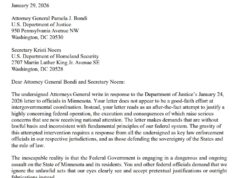 So now that Bob Goodlatte has visited the border and determined that all blame for the immigration crisis du jour rests squarely on President Obama’s shoulders, maybe we can get to some substantive discussion. Dismissing Goodlatte’s and Darrell Issa’s grandstanding on its face, a well-considered, rational strategy is essential.
So now that Bob Goodlatte has visited the border and determined that all blame for the immigration crisis du jour rests squarely on President Obama’s shoulders, maybe we can get to some substantive discussion. Dismissing Goodlatte’s and Darrell Issa’s grandstanding on its face, a well-considered, rational strategy is essential.
“Word has gotten out around the world about President Obama’s lax immigration enforcement policies, and it has encouraged more individuals to come to the United States illegally, many of whom are children from Central America.” – Bob Goodlatte, R-VA 6th
This is a ridiculous and simple-minded assertion designed to play on prejudice and fear. The law that codified current policy toward unaccompanied minors, the Trafficking Victims Protection Reauthorization Act (TVPRA) was enacted in 2008 and signed by President Bush. Reagan administration policies in and subsequent neglect of countries in the Central American Northern Triangle, which includes Honduras, Guatemala and El Salvador, have directly led to the highest homicide rate per capita in the world. These governments cannot contend with rising levels of violence. Internally displaced persons constitute the bulk of those displaced but increasing numbers of people are crossing state boundaries in search of safety. However, criminal gangs are transnational, meaning there is no sanctuary obtained by crossing an adjacent border.
The TVPRA requires the establishment of standards for custody, creation of more child-friendly asylum procedures, and relaxation of eligibility for Special Immigrant Juvenile Status (SIJ) visa status. These are simple internationally recognized expectations of humanitarian treatment. Do the critics believe that inhumane treatment of children for their first 72 hours or so in America will somehow discourage migration?
All the children from the Northern Triangle countries are immediately placed in removal proceedings. 90% of these children are released by Office of Refugee Resettlement (ORR) into the care of a parent, relative, or family friend while they await adjudication of their immigration cases; the others are placed in foster care. Only a small portion will ever be repatriated. U.S. Immigration and Customs Enforcement (ICE) carried out 496 repatriations (removals and returns) of juveniles from Guatemala, Honduras, and El Salvador in 2013, down from 2,311 in 2008.
There is the contention that minors migrate because they believe that they could benefit under the Obama administration’s Deferred Action for Childhood Arrivals (DACA) program. DACA offers a deferment of deportation for unauthorized immigrants who have lived in the United States since 2007. Perhaps they believe they can be transported back in time to qualify or that somehow the record of their entry date will be lost. However there are far more immediate dynamics affecting migration. According to the UNHCR, 81% of the children gave joining a family member or pursuing better opportunities as reasons for migrating to the United States.
“[Goodlatte] made it clear he stands ready to make minor changes to the law that would correct imperfections” in the last immigration rewrite passed in 2008, (Rep. Darrell) Issa (R-CA), said. “But the 2008 law did not cause this. The president’s own statements and policy caused this. Any changes in the law would have to involve the president’s (sic) reversing.” – as reported in Roll Call
Plus there is the profit motive Republicans always like to bat around until it comes time to actually apply it. Drug cartels have diversified, building a stronger, more sophisticated, more profitable smuggling infrastructure. These networks play a role facilitating the rise in children crossing the border by themselves by providing what Diana Villiers Negroponte characterizes as “door to door service.”
In a Brookings Institution Brief, Negroponte makes six policy recommendations in response to this problem that has existed for more than a decade:
- Federal law enforcement authorities must confront and prosecute these criminal organizations which profit off unaccompanied children, as well as other undocumented migrants. Transnational efforts are needed to identify them and their work in the sending countries, as well as to disrupt their money laundering practices.
- Apprehended children need to be screened by ORR as swiftly as possible to determine the validity of their claims. The White House’s anticipated request for congressional action on a supplemental appropriation of an additional $2 million for immigration courts, among other issues, will not prove sufficient to legally process newcomers as well as hear the backlog of cases. Therefore, greater attention should be given to hearings for children arriving after July 2014 with the intent of sending a strong message to the sending country that their unaccompanied children will not be able to join their parent or family member while they wait 18 months or more for a court appearance.
- Swift resolution of refugee asylum and Special Immigration Status cases will require a significant budget to increase the number of asylum officers, immigration judges and to train both prosecution and defense attorneys. This may come from civil society, but national support for training in the law could help to ensure that young defendants have a guide through the mysterious world of immigration law.
- The backlog of ORR cases will take time to work through and should be accomplished, but the immediate task is to send a strong disincentive message to the adults who both send and receive these children.
- Distinctive treatment between those arriving from Mexico and Canada and those arriving from non-contiguous states may have to end. Nearly all Mexican unaccompanied children are quickly returned to Mexico. With the assistance of Consuls from the countries of origin, a decision to deny asylum and Special Immigration Status requires governmental assistance in the repatriation and reintegration of the child back home. Civil society should monitor the returning children to ensure that they are not abused.
- Over the longer term, the perennial concern for economic development and education in the sending nations of Central America endures. Levels of poverty have not decreased enough to ensure job creation and quality education. Standards of living must increase in order to persuade those who care for the children that the risks of the journey are not worth the gains in the United States.
Subsequent to Ms Negroponte’s brief, the Obama administration has undertaken a billion dollar public relations campaign directed toward the parents of children tempted to send them to the border. And Representative Luis Gutierrez (D-IL) has invigorated his own campaign (which made a stop last year in Harrisonburg) against recalcitrant, head-in-the sand Republicans like our very own Bob Goodlatte and his buddy Darrell Issa.











